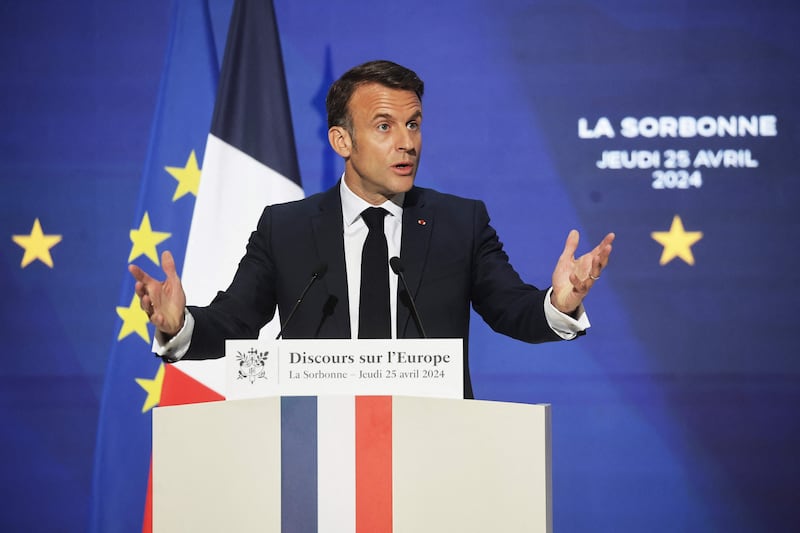French President Emmanuel Macron on Thursday attempted to instil a sense of urgency in the need to respond to Europe's weakening role on the global stage by calling for a response based on "power, prosperity and humanism" ahead of a tense European election in June.
"We are at a tipping point and Europe could die," Mr Macron told an audience of politicians, ambassadors, government officials, students and think tank members. "It is up to us to make the right choices."
Mr Macron was speaking at Sorbonne University in Paris as he tried to garner a similarly enthusiastic reaction to a landmark speech delivered in 2017. It was widely viewed as visionary due to its call for a common European defence, five years before Russia's full-scale invasion of Ukraine.
In a sweeping speech on Thursday in which he tackled a broad range of issues including European Central Bank reforms and stricter online parental controls, Mr Macron warned Europe had a problem of "rhythm and model".
"The era when Europe bought its energy and fertilisers from Russia, produced in China and delegated its security to the US is over," said Mr Macron.
"The rules of the game have changed and Europe must respond with power, prosperity and humanism."
He highlighted Russia's full-scale invasion of Ukraine in 2022 as the number-one threat to Europe's security. "The fact that has returned to European soil due to a nuclear power changes everything. The fact that Iran is about to obtain the nuclear weapon changes everything," he said.
Europe is fragile but also special, which is why it should survive, said the French President, who is viewed in some quarters as the strongest leader on the continent.
"Being European means defending the idea that a free and rational man comes above all else.
“Europe is not a ticket office in which we agree, in some way, to choose the principles. This is also why we must strengthen our capacity to fight interference and propaganda, particularly during these electoral times."
Mr Macron accused China and the US of disrespecting international trade rules and called on Europe to rethink its economic model. "The risk is that Europe falls behind," he said, arguing that the bloc must invest more in its defence and green technology. He backed the idea of a European loan to finance military purchases.
The French leader condemned attacks against liberal European democracies, as French security services have become increasingly vocal about their fears of Russian cyberattacks during the coming election. "Our Europe has more and more challenges in its ability to be attractive as a political model," he said.
He called on stronger controls at European borders to stop illegal migration, while also criticising the British model of sending asylum seekers to Rwanda.
"We're creating a geopolitics of cynicism, which betrays our values and will build new dependencies, and which will prove completely ineffective," he said.
Mr Macron's speech was also an attempt to defend his European legacy ahead of the June election as his party struggles in the polls, which show the far-right Eurosceptic Rassemblement National (National Rally) ahead, with more than 30 per cent of the vote.
Valerie Hayer, an MEP with no government experience, backed by Mr Macron, is projected to obtain 17.5 per cent of the vote, while her centre-left colleague at the European Parliament, Raphael Glucksmann, is at 12.5 per cent.
There are fears Ms Hayer could come third in the election, which would further weaken Mr Macron's position after a series of unpopular reforms.
The President's advisers have however denied reports that his speech was aimed at reinvigorating his allies' political campaign in the run-up to the election.
Speaking ahead of the event, they highlighted that it precedes a meeting next month of the EU's 27 leaders, during which they will adopt the bloc's strategic agenda for the next five years.
Mr Macron hopes to "guide and influence this next agenda strategic of the European Union", an adviser said.
In a signal that he aimed to speak to a European audience, not only a French one, Mr Macron's highly anticipated speech was simultaneously translated into English and German. The choice of the Sorbonne University was symbolic, said one of his advisers, who described it as a "place of an intuition" and "a place of results".
Political opponents predictably criticised Mr Macron, with French far-left MEP Manon Aubry highlighting the lack of results of government investment in the green industry.
"Macron took stock of the helpless Europe that he himself created by closing factories, relocating drug production, multiplying free-trade treaties, destroying our public services," she wrote on X, former Twitter.
Ms Aubry is one of many MEPs who criticised Mr Macron for giving his speech on the same day as a plenary session in the European Parliament, meaning several politicians could not attend in person.
The far right did not immediately react to the speech, but RN figurehead Marine Le Pen previously said it would "mobilise" her voters.
She has also said that should Mr Macron suffer "electoral defeat" in June, she would call for Parliament to be dissolved and a new election.






